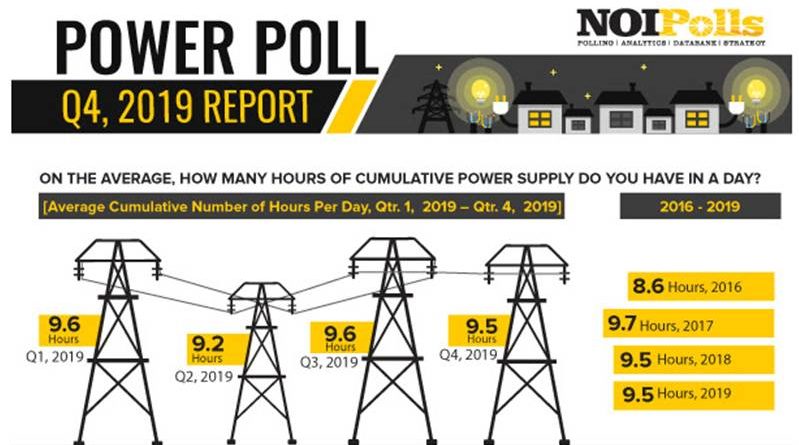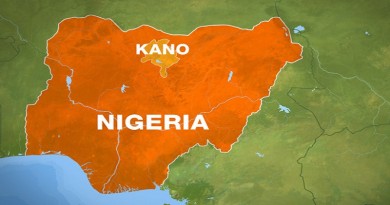Power Supply To Nigerian Households Still Inadequate – New Poll Reveals
The newpower poll released by NOIPolls for the fourth quarter (Q4) of 2019 has revealed that power supply to Nigerian households experienced a marginal increase to stand at 37 percent in Q4 from 36 percent obtained in Q3, 2019. A quarterly trend analysis of power supply in 2019 shows that the highest improvement in power supply was in Q1 and Q4, 2019 while the lowest supply occurred in Q2, 2019 as expressed by Nigerians interviewed.
Also, a monthly trend analysis of power supply in 2019 revealed that the month of January 2019 had the highest power supply while the lowest power supply was experienced in April 2019 as indicated by 46 percent and 28 percent of Nigerians respectively. It is also worthy to note that the current transmission capacity and network operational capacity are 7,000 Mega Watts (MW) and 5,500 MW respectively however, the peak generation ever attained in Nigeria in 2019 is 5,222.3 MW. [1]
Further findings revealed that the highest average cumulative hours of power supply were recorded in the month of January 2019 which stood at 10.2 hours per day whereas, the month of April experienced the lowest in terms of average cumulative hours of power supply (9.0 hours per day) in 2019. This cumulative hourly average recorded in January 2019 is inadequate when compared to an ideal 24 hours of power supply which is required for the overall progress and development of the country and its citizenry.
Therefore, to drastically improve on the status quo on the electricity sector, experts in this sector needs to identify more efficient means of electricity generation. For instance, the use of embedded generation will help eliminate the long distance the power travel to get to the end user and will ultimately improve supply of electricity[2]. It is therefore advised that Government and stakeholders in the power sector synergize to provide adequate power supply. This is important because the decline in power supply will continue to hampered economic activities, especially of businesses whose operation depends majorly on power supply. These are some of the key findings from the power poll conducted by NOIPolls in Q4, 2019.
Survey Findings
Quarterly Trend on Power Supply
Quarterly analysis indicated that a larger proportion of Nigerians in Q1 and Q4, 2019 (37 percent each) reported that they experienced better power supply to their respective households than in Q2, 2019 (31 percent).

Quarterly Average Daily Cumulative Power Supply to Nigerian Households
Furthermore, on a quarter-on-quarter basis, the average hours of cumulative power supply to Nigerian households in Q1 and Q3, 2019 were 9.6 hours each respectively, this was the highest recorded hours when compared to the 9.2 hours obtained in Q2, 2019.

Monthly Trend on Power Supply
Monthly analysis of power supply to Nigerian households from September to December 2019 revealed a steady increase as depicted in the chart below. The poll findings also showed that Nigerians experienced more power supply to their households in January (46 percent) and December (40 percent) 2019 than any other month in review.

Monthly Daily Cumulative Hours of Power Supply to Nigerian Households
Subsequently, analysis of the poll result revealed that the month of January 2019 recorded the highest(10.2) daily cumulative hours of power supply to Nigerian households while the lowest (9 hours) was the month of April, 2019.

Yearly Trend on Power Supply
A four years trend analysis revealed that Nigerians experienced worse power supply in 2019 (35 percent) when compared 20018, 2017 and 2016 respectively.

Yearly Cumulative Hours of Power Supply Daily
Yearly cumulative power supply revealed that 2017 (9.7 hours) has the highest average cumulative hourly power supply in the last four years when compared to 2019 and 2018. However, the lowest in the last four years was recorded in 2016 with an average of 8.6 hours per day.

In conclusion, the poll result revealed that Nigerians experienced better power supply in Q1 and Q4 in 2019 with an average cumulative hours of power supply per day of 9.6 and 9.5 hours respectively. This average cumulative hour of power supply to Nigerians households is grossly inadequate for the country therefore requires urgent attention for improvement. Although, there are challenges experienced in the sector which include vandalism, theft of equipment, pipe breakage in the case of gas supply, general infrastructure deficit and many others, however it is expected that the stakeholders will surmount these challenges and put the country on track of uninterrupted power supply in order to foster greater economic development in Nigeria. The government and stakeholders can leverage on other forms of power generation like solar, wind and geo-thermal etc. which is the most viable option to ameliorate the power problem in the country.
Survey Methods
The opinion poll was conducted over a period of three months (October to December 2019). It involved telephone interviews of a proportionate nationwide sample of 3,000 randomly selected phone-owning Nigerians aged 18 years and above, representing the six geo-political regions and 36 states and the FCT of the country. Interviews were conducted in 5 languages – Igbo, Hausa, Yoruba, Pidgin English and English. Although we can say with 95% confidence that the results obtained were statistically precise – within a margin of error of plus or minus 4.65%; we recognize that the exclusive use of telephone polling has its limitation of excluding non-phone-owning Nigerians. Nonetheless, with the country’s tele-density put over 100 percent by the Nigerian Communications Commission (NCC), we consider our telephone polling approach appropriate. Also, given the rigorous scientific process of randomization and stratification applied, we can confidently stand by the validity of our methodology and approach.
NOIPolls Limited, No. 1 for country specific polling services in West Africa. We conduct periodic opinion polls and studies on various socio-economic and political issues in Nigeria. More information is available at www.noi-polls.com.
Disclaimer
This press release has been produced by NOIPolls Limited to provide information on all issues which form the subject matter of the document. Kindly note that while we are willing to share results from our polls with the general public, we only request that NOIPolls be acknowledged as author whenever and wherever our poll results are used, cited or published.
NOIPolls hereby certifies that all the views expressed in this document accurately reflect its views of respondents surveyed for the poll, and background information is based on information from various sources that it believes are reliable; however, no representation is made that it is accurate or complete. Whilst reasonable care has been taken in preparing this document, no responsibility or liability is accepted for errors or fact or for any views expressed herein by NOIPolls for actions taken as a result of information provided in this report. Any ratings, forecasts, estimates, opinions or views herein constitute a judgment as at the date of this document. If the date of this document is not current, the views and content may not reflect NOIPolls’ current findings and/or thinking.




